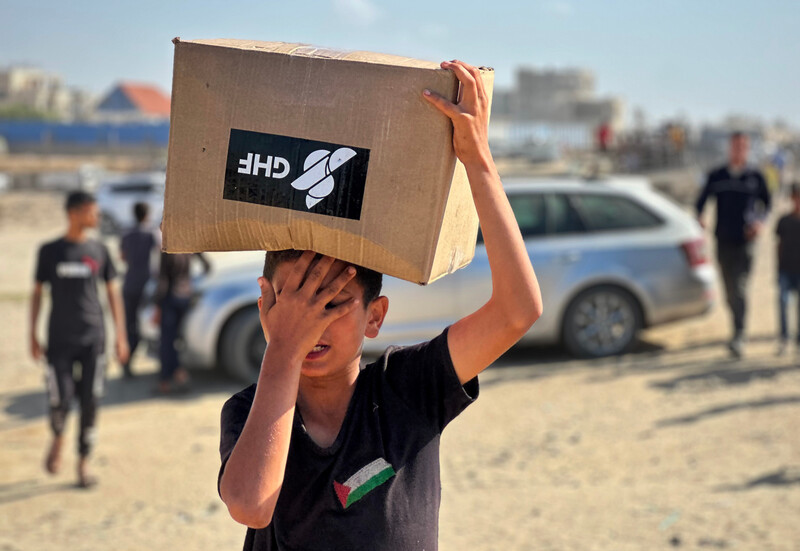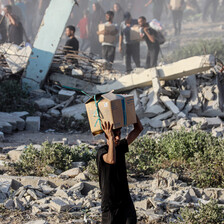The Electronic Intifada 17 June 2025

People gather to collect aid from the US-backed Gaza Humanitarian Foundation, in Rafah, southern Gaza Strip, on 27 May.
APA imagesIsrael has been starving us for months. It cut off all aid to Gaza in March, only to recently approve a US-led, militarized aid site run by the so-called “Gaza Humanitarian Foundation.”
The consequences are not abstract – they are visceral, immediate and devastating.
On 27 May in Rafah, thousands of hungry and desperate people surged toward the site seeking food and water. They had no option.
When security contractors lost control of the site, Israeli forces reportedly opened fire on the crowd as people scrambled for anything they could grab.
One image went viral: Palestinians packed tightly into fenced queues, in a space resembling a cattle chute, waiting under the burning sun for bags containing the bare minimum — flour, canned beans, dry pasta, vegetable oil.
Why must we be humiliated and starved before we are killed?
This is not a consequence of a series of unfortunate events. It is a calculated, systematic strategy: to fracture our spirits in Gaza, strip away our dignity, and prepare us – and the world – for the next, more acceptable form of violence.It makes us long for death, convincing us it is the better option.
I regularly hear people say, “They’re lucky,” when someone is killed as if finally, they got relief. I’ve even seen people outside Gaza commenting on the murder of our children with similar words.
Why are we left with only two options: humiliation or death?
This humiliation isn’t just a feeling – it’s a machine: a slow, grinding mechanism that turns a living people into something less than human in the eyes of the world – and eventually, in our own eyes.
We’ve been reduced to hungry and desperate people with children carrying empty plates and pots, confined to dirty, temporary shelters. This is a prelude to death. It is economic, psychological and social conditioning that makes the intolerable seem ordinary.
Humiliation
I remember when the Israeli army invaded our house in the al-Rimal neighborhood of Gaza City on 8 December 2023. When I saw them entering – carrying weapons after bombing the door – I felt a strange relief. Finally, I thought, I could die in peace.
There had been no clean water or edible food in our home for three days. The neighborhood was under military siege. Tanks seemingly shelled everything and bullets pierced our shattered windows and doors. A nearby house was bombed while we were still inside, and we feared ours would be next.
Soldiers ordered us to raise our hands and form two queues – one for women, the other for men. The men were told to strip and were taken to another room for interrogation. The Israeli army seemed obsessed with school-style orders: stand in line, sit down, shut up.
One soldier told us to sit on the floor while he sat in a chair, gazing at us in a strange and frightening way. He opened his energy drink and downed it in one gulp. Then he ate his snacks. I was insanely thirsty and hungry. We all were.
They forced us to leave the house in the cold and dark – without our phones, without light, without even knowing where we were supposed to go. We carried no clothes. We had no idea if our home would be destroyed after we left.
I was terrified. I couldn’t see anything but an aggressive military dog. I tried to walk along the edge of the path to avoid it, but one soldier screamed and waved his gun, threatening to shoot if I didn’t hurry. I ran frantically, desperate to get out alive.
My grandmother, born just months after the Nakba and now in a wheelchair, fell when a nearby explosion jolted her chair. After a long and exhausting walk, with the stars our only light, we reached Al-Shifa Hospital to spend the night. We entered a random room, and I stretched out on the dirty floor — hungry, thirsty, exhausted — unable to believe I was still alive.
I didn’t sleep.
The voices of the wounded and patients screaming in pain were terrifying. I cried in silence like I had never cried before. My life wasn’t taken from me, but my dignity was.
Normalized brutality
After 20 months, I’ve lost the ability to imagine what the future holds for me. Sometimes, I even wish there will be no future at all.
Israel’s structure of oppression does not just control us. It strips us of our humanity and turns us into objects of pity or degradation. Israeli soldiers have shared many photos of themselves destroying Palestinian homes and personal belongings, or showing Palestinian prisoners without clothes, herded like cattle.
At every checkpoint, in every queue for water or food, in the constant denial of basic human necessities and safety, an atmosphere is created where violence against us is not only accepted but expected.
We are framed as a threat to the state and its allies, and so brutality becomes normalized.
To understand what is happening in Gaza, one must look beyond the images of destruction and see the architecture beneath. It is an architecture built not only from the rubble of homes and infrastructure, but from the daily rituals of humiliation – the kind that teaches you to expect nothing, to never raise your head beyond a pot of tasteless food or a jug of unclean water.
It conditions you to accept suffering as routine. To see yourself, eventually, the way the world sees you – as a burden, or a threat, or as the former Israeli defense minister Yoav Gallant put it, “human animals.”
This is the kind of violence that rewrites who we are. It reshapes not just how we live, but how we dream, what we expect from life, how we remember and even how we grieve.
Malak Hijazi is a Gaza-based writer.





